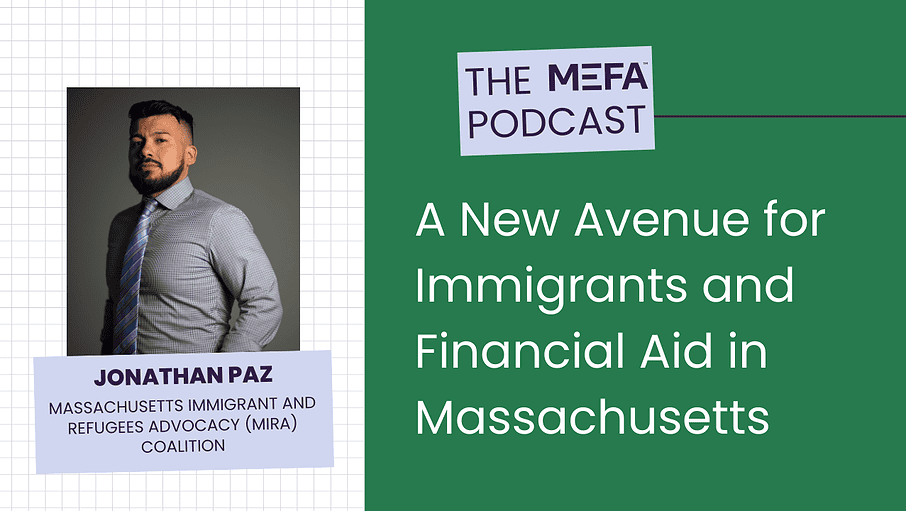

Resources Mentioned in this Episode
Jonathan Hughes: [00:00:00] For many years when MEFA has presented on financial aid to the parents of seniors and juniors in high school We came to a point in the presentation where we noted that some states had aid options for undocumented or immigrant students, but that Massachusetts was not one of them. That’s changed recently with new legislation, and this is really big news.
for the immigrant community and for those who counsel them. And so we’re here to talk about what this means is Jonathan Paz. He’s here from the MIRA coalition, which stands for the Massachusetts Immigrants and Refugees Advocacy Coalition. Jonathan, welcome to the MEFA podcast. Thank you so much for having me.
Jonathan Paz: No, it’s my pleasure.
Jonathan Hughes: Before we get started on the nitty gritty here can you tell everybody just a little bit about yourself?
Jonathan Paz: Yeah. So [00:01:00] I’ve, I think I was born into being a policy advocate at some point in my life I’m the son of Bolivian immigrants who thankfully raised me in in Massachusetts in the beautiful city of Waltham.
But yeah, I was, I always tell people I didn’t choose politics. Politics chose me. Especially when your parents are undocumented post 9/11 you get to see a lot of the injustices and that was a driving factor for me to question, our broken immigration system. But I- to fast track a little bit after Massachusetts won the driver’s license campaign, which I was involved in I saw an opportunity to really continue that opening, I think, to evolve the conversation because for, for 20 years, we left out our immigrant students and we created barriers to a higher education. I was out there in the streets helping get people involved. It’s a longer story, but when we passed the driver’s bill, I think the wheels started turning in our statehouse and with a new governor, I think [00:02:00] people became more open to the idea that education equity needs to include our immigrant students. And I joined MIRA. It’s been an honor to see this come to fruition in my first year at MIRA. And it’s really incredible to see how far we’ve come.
Jonathan Hughes: Can I ask that about if you don’t mind what your education experience has been?
Jonathan Paz: Yeah. I was born in Boston. I think the, that’s the interesting thing. My oldest sister wasn’t born in this country. I have two sisters and a brother. So my oldest sister, I saw her struggle when she was in high school.
And I saw my siblings struggle because, when you’re not, you’re not made of wealth in this country it’s all an uphill climb. So I knew my sister couldn’t. It was just like this unspoken thing. My sister couldn’t afford to go to college, so therefore I have to get a full ride.
It was this expectation. Mom and Dad are not going to be able to be able to help me financially. So I from the jump already made that connection in middle school and high school that I needed to go to [00:03:00] college. My parents always. promoted this. They always saw this as a priority.
My father always put on the discovery channel. He always try to make sure that we were keeping up with the classes. But I think it was just this mindset where I’m not an immigrant, but I am.
Jonathan Hughes: So tell us about the MIRA Coalition then. What kind of work does mirror do generally and specifically for students?
Jonathan Paz: Yeah. So I guess it’s what don’t we do at MIRA? We provide citizenship classes to folks who are on their way to becoming citizens. We do a lot of advocacy at the federal level at the state level. And we do a lot of trainings but more specifically when it comes to tuition equity we are now providing trainings, train the trainer sessions.
From school counselors to educators, to anyone in the community who wants to learn more about this law, we’re working to get the word out, but we’re also trying to make sure people don’t get lost in the details. We’re trying to streamline this process as best as possible, and we’re consistently meeting, [00:04:00] now we have standing meetings with the Department of Higher Education, to make sure that we get this implementation right.
To make sure that we’re providing the best feedback as things evolve, as things change. So we’re trying to make sure that this is as inclusive, as expansive of a law. So we have been very blessed to have a very strong partnership with the Department of Higher Education to make sure this is as good as it can be.
And this is hit the ground running, right? Time is of the essence here, right?
Yeah. And it’s so important, that that truism, if a tree falls and no one’s there to hear it, did it ever make a sound? And that’s where we’re at. I’m very happy to see that the governor has prioritized this and its rollout.
They have staffed up a DHE, the department of higher education. But yeah, we already had two summits in December with over 100 school counselors for one. And then we had close to 100 people come out to a different summit with all the state university admin, from financial aid officer to admission officers, because we need to get it right on both sides.
[00:05:00] The state universities and community colleges need to be able to communicate effectively, but also the community needs to become more involved, more engaged, more familiar with what this pertains. So it has been a very quick rollout but I think at MIRA we prioritized it. So we’ve had a very strong team and collaborate, collaborated with a lot of partners.
And we’re very grateful for MLRI, the Mayor’s office in Boston just to name a few student Sim, a stories inspiring movement. So we’ve had, we’ve been able to convene a table to make sure that we are constantly trading notes, constantly hearing from each other, but also providing that feedback directly to the department of higher education.
Jonathan Hughes: All right. So let’s get into exactly. What this law is. Can you take us through that?
Jonathan Paz: Yeah. So there’s two major components to this law that make it so important. And just to backtrack for 20 years, we have provided, we created. Arbitrary barriers to a higher education for immigrant [00:06:00] students, 20 years, too long.
We have overcharged immigrant students and out of state rate for tuition, meaning that they would pay three to four times as their counterparts in the same classroom. So the major wind that we want, we got is in state tuition for immigrant students. There were some exceptions to that. I’m not going to get into that real quick, but just that is a major win because all of a sudden the price tag goes down.
And everyone right now is suffering from this inflation, greedflation. But the reality is that students have been blocked because of that high increase. Number two is that now all immigrant students have access to financial aid. DACA is the thing that’s behind in people’s minds. I thought we fixed this. A lot of legislators thought DACA was figuring this all out. The only thing that we were able to do that’s substantial was provide DACA students, people who are considered DACA by the federal government, to have access to in state tuition. They had no access to financial aid.
Jonathan Hughes: [00:07:00] And could you just actually back up for a minute, just in case anybody isn’t sure. What DACA refers to?
Jonathan Paz: Yeah. So it’s deferred action on childhood arrivals. If you were brought into this country by your parents with under a certain age you got this designation where you’re at this ambivalent status where you’re not under threat of deportation and you’re actually given some degree of identification by the federal government.
You’re able to acquire higher education there’s, it allows people to blend into the system, but they’re not fully empowered. They’re not fully of an actual status that empowers them. It just creates this kind of it streamlines it in a very kind of informal way.
Yeah. That is, so it is a workaround from the president’s Obama at the time who created this initiative and it’s under attack by the courts. It’s as if like Massachusetts finally acknowledged that we were stagnating. Our education systems were stagnating. So at least this past year in [00:08:00] 2023, we were able to finally make a case, new governor, new politics.
We were able to make the case that this is going to benefit everyone. It’s not just going to benefit these students. Our state universities had enrollment was down. We don’t benefit from not having that kind of diversity in the classroom. The genius that these students provide has been them. In a way mitigated. We’ve pushed them out. They would have to go out of state.
Jonathan Hughes: So what aid is actually available to these students?
Jonathan Paz: So yeah, this is really exciting. And what we were able to achieve, thanks to a really strong partnership with the Senate president’s office, we created, I think the best version of this bill and We brought it into law through the budget last year.
We’re not only talking about one comprehensive document, right? Taken into steps. The first thing is just you have to fill out this document saying that if you went to three years of high school and graduated, you got a GED or diploma, you would become, we created this thing called a high school completer status. So you [00:09:00] get designated as a high school completer status and automatically you’re eligible for in-state tuition. That was already available to people going as far back as October. Which is remarkable. That’s very fast turnaround for you never hear the word fast and government together in one sentence.
So this is an incredible opportunity. So that is one component. And once you’re considered a high school completer status, you go to this portal and you fill out your information to show the need. So that student would have access to the same kind of merit based scholarships, right? And need based grants.
That’s another way of saying financially. The great part about this is that one portal is like the sum of a lot of learning from other states. Not only do they only fill out that first application once, they don’t have to keep doing it but they also just have to go online.
And it’s, this modern portal where you provide all this information. It’s a pretty decent design. We collected all this [00:10:00] information. And the Department of Higher Education did their due diligence. We took all the learnings from California, from Texas. And we pieced it together to make sure that we’re streamlining this, because the last thing you want to do is create another barrier in the process.
And if I could just mention one last thing because I keep getting excited I think it’s important to know they would actually have access to graduate school. So yeah, so if it’s I believe if it’s law school or medical school, they would also be able to have access to that financial aid.
Jonathan Hughes: Putting yourself in the place of a student who is now eligible for state based in state tuition from Massachusetts, who was not previously, what they need to do is they need to go and sign that form. The high school completer form. Is that right?
Jonathan Paz: I think the first thing I would tell them is go get your high school transcript.
Jonathan Hughes: Okay.
Jonathan Paz: That is the first step is go get your transcript. And then you have this form. [00:11:00] It’s very wonky. But at the end of the form, all you have to say is, sign an affidavit saying that within a certain amount of time, you have to if you’re eligible for a green card or a citizenship, you will do it.
An affidavit is just a way of saying you make that promise in that form. You can also submit a social security card, an ITIN, or a selective service thing, but we anticipate everyone in that form to just sign that affidavit. It’s a promise that if and when you’re eligible for a green card or a citizenship, you’ll do it.
So go get your transcript. Fill out this form, and as soon as you get approved through that form, go to the portal. And the portal’s online and I think this is as streamlined as it gets. It’s like a one, two, three punch.
Jonathan Hughes: And then when they get to the form, which is the MASFA, is that correct?
Jonathan Paz: Yes, MASFA. Thank you for mentioning that.
Jonathan Hughes: Yeah, sure. And that’s meant to mirror sort of the FAFSA which is the Free Application for Federal Student Aid. Which, students who are not U. S. [00:12:00] citizens or permanent residents are not eligible to receive aid from the federal government. But if they meet the other requirements now, are from the state of Massachusetts. This is the form that they need to file in order to be eligible.
Jonathan Paz: Correct. Yeah, it’s called MASFA. It’s, it rhymes with FAFSA. But yeah it’s a pretty streamlined portal and it helps get everything through.
Jonathan Hughes: And so this is good for public colleges in Massachusetts, correct?
Jonathan Paz: Absolutely. Think about it. This is such a game changer, I get that college isn’t for everyone. And that’s amazing that in this generation, we figured that out, but with private universities being so exorbitantly expensive and the job market, the way it is. This is a literal ladder to economic opportunity for so many of our students, so many to go to community college or state university and not have to incur so much debt.[00:13:00]
We’re talking about, you get a low reduced rate and then on top of that, you get some financial aid. Like people will get some financial aid and it’s not guaranteed, right? Because immigrant and poor isn’t always equivalent, but that is important to say, it’s like not a guarantee, but the state is pumping in more money millions of dollars more to provide more aid.
There’s a whole, initiative across the state that we don’t have enough people filling in these jobs. So this is an amazing opportunity to make sure that our immigrant students have a chance at economic mobility but also not in the sense of In current debt.
Jonathan Hughes: How are we getting in front of these students and letting these people know and know educated and that this is an option that’s open to them. Now, this pathway that was closed off is now open.
Jonathan Paz: Yeah. So to the potentially 3000 graduating students who would benefit each year from this. We’ve calculated that potentially 3000. To them. I would say this is [00:14:00] secured information. You do not have to worry about this information, your information being shared anywhere. We are asking for very different information and we’re not, the state’s not trying to hold onto that information either. We’re not trying to create a paper trail. The only thing we want to know is. Did you actually go to school here? That’s why that transcript thing I mentioned. But once that is in the hands of your state university or community college, you are protected.
And it’s federal law. It’s the Family Educational Rights and Privacy Act that a student’s personally identifiable information is protected from being shared with third parties. So these institutions are expected to refrain From unnecessarily obtaining information about a student’s immigration or citizenship status without a reason and only to be only to the extent needed to make tuition and financial aid eligibility determinations.
So we are actively pushing to make sure that this is even more [00:15:00] protected. It’s more robust. But what these families need to know is that. Yes, it takes a little bit of trust building, some degree of educational awareness. But, this is legit. This can change your children’s lives. I’m talking to the parents now.
But I do think, trust in the communities is very sensitive. And it’s important to note that, this is going to be protected information. They’re not going to ask. More than they need to. And we need to make sure that you’re telling your kids, in advance, if they’re sophomore, if they’re junior, if they’re freshmen, if they’re in middle school, tell them Massachusetts is here to actually be a vehicle to your higher education. You can do it. You can make it and you don’t have to break the bank.
Jonathan Hughes: That’s great. And what were you? I’m just curious now. What were you hearing in your meetings with counselors, that would be of use to them in this effort.
Jonathan Paz: I think it’s just important for, I think they had a little bit more of we’re hearing different from the colleges. We’re [00:16:00] hearing different from the, so there was a little bit of a gap and we’re still trying to make sure that we’re all speaking the same language here. We’re all speaking about the same requirements. But I think the counselors just want to make sure that. We are promoting the right thing and it’s a little bit of a sensitive topic because some high schoolers may not want to identify themselves as undocumented, or some college students may not want to identify themselves.
So we’re trying to make sure that we’re creating as accessible material as possible and trying to make sure that, this is as streamlined as possible. emphasize that enough. Because people get wary when it seems like it’s an extensive process. There’s a lot of examples of that in the Commonwealth where we had amazing programs, but like no one took advantage of it because it was so complicated and bureaucratic.
I don’t mean no one but, so that’s something that school counselors want. Multilingual easily accessible and very I think very accessible, forms, and [00:17:00] we’re getting that we’re providing that feedback to DHE. And there’s going to be, the governor already put in a request to even further amend this new law, some small details to create an even better system.
Jonathan Hughes: So in terms of. The success of the program and in terms of data do we have metrics of what we’re hoping to see? And essentially, how will we know this has been a successful program? And when do you think we’ll know that?
Jonathan Paz: With the rollout of a law like this, you normally try to assess things within a three to five year timeline. We have been doing everything possible to make this, get this as best as correct as possible within the first year. So I think that, I think of it as those 3000 students the mass fiscal lines calculated that possibly 3000 students would take advantage of this every year. So as close as we get to that number it’s hard, right?
Because we are immigrants are the uncounted and the students are the invisible. So there will be a learning curve. [00:18:00] But I do hope for the day where this is like a normalized process where we have success stories. We have people self advocating, sharing their story, sharing how this impacted their life.
But I do want to mention. What I personally think is also a measure of success is making sure that students right now who have been in college right now, get that retroactive credits and get that retroactive financial aid, because this is happening. This all has happened within a academic calendar, a school calendar year.
So a lot of the help that they’re getting right now. is going to be retroactive starting July 30th, July 1st of this year. So that’s a major win. It’s important, but let’s make sure those students are graduating. Let’s make sure those students can take full advantage of this program. That’s why we’re working so hard here at MIRA, and we’ve worked on this for the past 20 years, is that we want to make sure that there’s a tangible impact, a tangible [00:19:00] benefit for everyone.
Jonathan Hughes: That is an amazing turnaround to have this policy designed and the forms all implemented and everything for students the year that you are actually implementing it. So congratulations on that. Is there anything else before we go that you’d like to say?
Jonathan Paz: I just got to say I am blessed to stand in the shoulder of giants. This has been a movement struggle for many years. A lot of brave people, a lot of strong people fought for this. Going way back to Governor Romney. I think that we, it is on us to really deliver on what can be poetic justice, which is making sure that every student who is eligible for this has access.
So we look forward to that partnership. We’re going to do our part to make sure that we’re advocating for the best rollout of tuition equity. And yeah let’s get to work. Let’s make sure that equity includes our immigrant students.
Jonathan Hughes: Okay, Jonathan, thank you so much.
Jonathan Paz: Thank you.[00:20:00]
Jonathan Hughes: All right. Thank you, Jonathan, so much. Remember, folks, if you liked what you heard today and you want to know more from us on planning, saving and paying for college and career readiness then you can follow the show and you can find us wherever you get your podcasts. Please remember to leave us a review because it does help us to keep doing what we’re doing and getting this show out to folks like you.
I want to thank our producer, Shaun Connolly. I want to thank AJ Yee, Lauren Danz, and Lisa Rooney for their assistance in posting the show. Once again, my name is Jonathan Hughes, and this has been the MEFA Podcast. Thanks.













